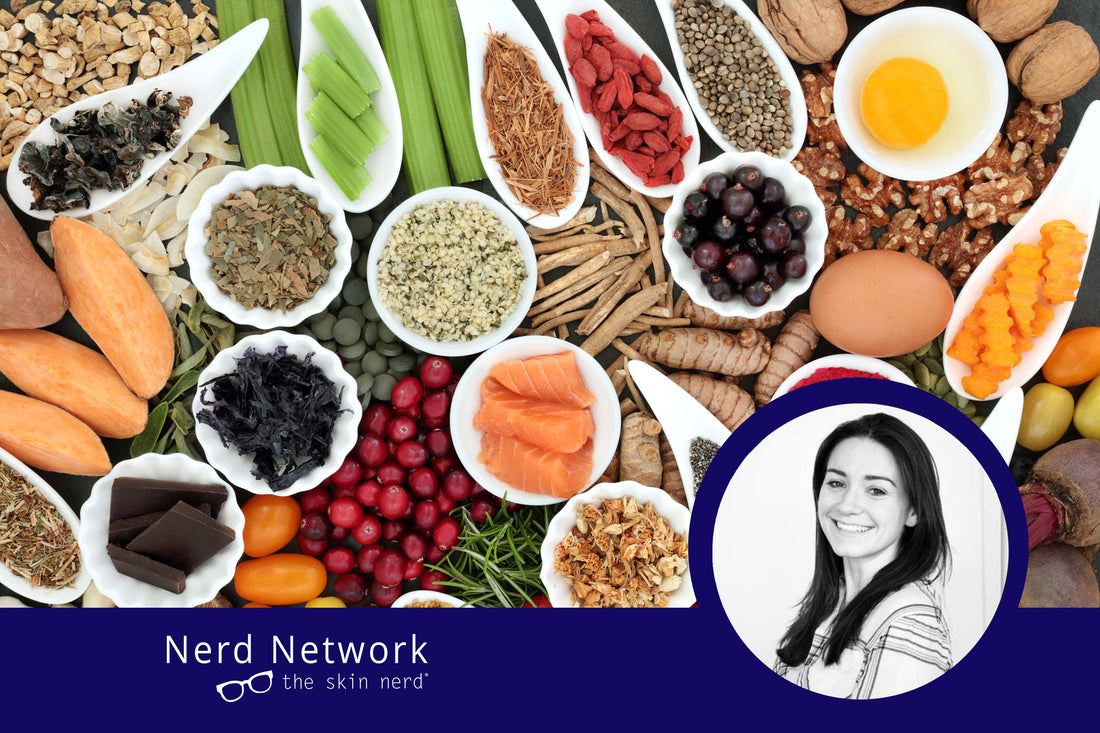
From The Inside Out: Vitamins, Minerals and Essential Fatty Acids
Laura Kealy of Bridge Nutrition explains why particular vitamins, minerals and essential fatty acids are pertinent to our skin health. As we say, you need to feed the skin from within and Laura's advice will help you to load up on skin food...
In recent times, we are far more aware that what we eat and drink has a significant impact on our health and wellness. We are bombarded every day through media outlets about how we need protein to build muscle, vitamins to ward off flu, carbohydrates to keep us energised and so on. Most of us make some kind of an effort to make healthy choices in our daily eating habits, and with a little guidance and education, it is the sum of these small, daily efforts that will have a significant impact on our overall wellbeing.
So we know that what we eat and drink affects our health, our immune systems, our energy levels and our shape and size. However, why do so many of us overlook our nutrition when it comes to the health of our skin? While we can certainly improve our skin from the outside, why not do it from the inside as well?!
The skin is the body’s largest organ, and like all of our organs its health is directly impacted by the quality of our personal nutrition. Micronutrients (vitamins and minerals) are only needed in trace amounts in our diets. However, don’t let that fool you into thinking that these powerful nutrients don’t have a massive impact on our skin's appearance, function, and overall health. Ensuring your body gets adequate amounts of these micronutrients is key to optimal skin health, be it through topical creams, supplementation, or (ideally) through nutrient-dense foods.
Vitamins
Vitamin C
Our skin naturally contains high concentrations of vitamin C. This micronutrient supports important functions including the stimulation of collagen synthesis and reducing UV-induced damage by boosting antioxidant protection. As we age and as our skin is exposed to UV light and pollutants, the vitamin C levels in our skin reduces.
Ensuring we have enough vitamin C in our diets will help fight this reduction. Although we typically think of oranges when considering foods high in vitamin C, don’t forget about peppers, broccoli, tomatoes, potatoes (both white and sweet), spinach, and other leafy greens!
Vitamin E
Vitamin E is a powerful antioxidant and is essential for optimal skin health. This vitamin's main function when considering skincare is to protect against damage caused by the sun, which it does by absorbing harmful UV rays. It also has an anti-inflammatory effect reducing UV induced skin swelling.
Foods such as sunflower seeds, almonds, pine nuts, peanuts, salmon, and avocado are all rich in this skin protecting micronutrient.
Vitamin A
Vitamin A is a fat-soluble vitamin. There are two types: retinoids and carotenoids, both of which are converted to retinol in the liver. The role of retinol in our bodies is to stimulate the production of new cells, making it an integral part of any healthy diet. A lack of vitamin A in our bodies will reduce the production of retinol and may result in overly dry skin. Carotenoids are packed full of antioxidants. Previous research has reported that diets high in carotenoids, especially beta-carotene, can prevent, premature skin ageing, cell damage and other skin diseases.

This is a vitamin you want in abundance in your diet. Look to foods such as carrots, spinach, sweet potato, kale, leafy greens, paprika, cayenne pepper, and chilli powder for carotenoids, and dairy products, salmon, eggs, and shrimp for retinoids.
B-complex
B-complex refers to 8 different B vitamins, which are chemically distinct but are found in similar food sources. B-complex is required in our bodies for nearly every process that occurs in our bodies, from fuel utilisation to organ function. As it aids cell metabolism, it is vital for skin health, reducing the effects of ageing, increasing UV protection, and improving circulations improving blood flow to the skin.
Although there are 8 different B-vitamins, sources high in B-complex to include in your diet are eggs, fish, seafood, green leafy vegetables, whole grains, legumes (beans, peas, and pulses), nuts, seeds, avocado and bananas.
Vitamin K
Another powerful antioxidant, vitamin K helps protect against and repair free radical damage. This fat-soluble vitamin is also involved in tissue renewal and new skin cell production. These effects results in a healthier, younger looking complexion.
Get the green veg into your shopping basket for this potent micronutrient. Foods high in vitamin K include: spinach, kale, broccoli, brussel sprouts, asparagus and romaine lettuce.
Minerals
Selenium
When paired with vitamin E, selenium helps boost glutathione levels in the body, an antioxidant which has been linked to the control and reduction of acne. If you are a smoker or drink more alcohol than the recommended amount, you are at a higher risk of selenium deficiency.
Salmon, beef, turkey, lamb, liver and brazil nuts are good sources of Selenium.
Magnesium
Insufficient magnesium in the diet can lead to premature ageing. This mineral works as an anti-inflammatory and is also a precursor for vitamin C, which as we have already mentioned, is vital for skin health. Magnesium deficiency may also lead reduction of glutathione, which your body uses to fight off damage from free radicals.
Snacking on various nuts including brazil nuts, hazelnuts, almonds, pecans, and walnuts will boost the magnesium levels in your body. Kidney beans, lima beans, spinach, dates, lentils, and brown rice are also good sources.

Zinc
Zinc is your go-to mineral for skin damage repair, working as a UV protector and a potent antioxidant. Similar to magnesium, it works as an anti-inflammatory as well as regulating the release of vitamin A from the liver.
Animal-based foods like oysters, beef, crab, lobster and pork are all highest in zinc. However you can look to fortified cereals, baked beans, yogurt, cashew nuts and chickpeas as plant sources for this mineral.
Essential Fatty Acids (EFAs)
If you’re wondering whether you really need EFA’s in your diet, the clue is in the name; Essential Fatty Acids! EFAs refer to omega-3 and omega-6 and these nutrients are the building blocks of healthy skin membranes. They are also called PUFA’s (polyunsaturated fatty acids) and help produce the natural oil barrier in your skin, keeping it plump, hydrated, and looking young. Studies have also linked EFA’s to the reduction in inflammation associated with acne.
To boost the omega-3 levels in your body include oily fish (salmon, sardines and mackerel) at least once a week, and choose snacks like walnuts and flax seeds. As omega-6’s are sufficient in the western diet, as they are in baked goods, poultry, and grains, we generally get enough in our daily nutrition.
They say beauty comes from the inside. Focus on a balanced, plant-based diet with lean meats, healthy nuts and seeds, and pulses, to give your skin the foods it needs to shine and you will not only be healthy on the inside but radiant on the outside too.
Written by Laura Kealy of Bridge Nutrition, expert nutritionist and resident nutritional contributor to our Bridal Bootcamp.
